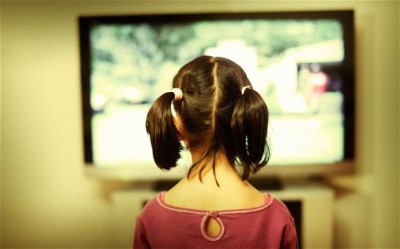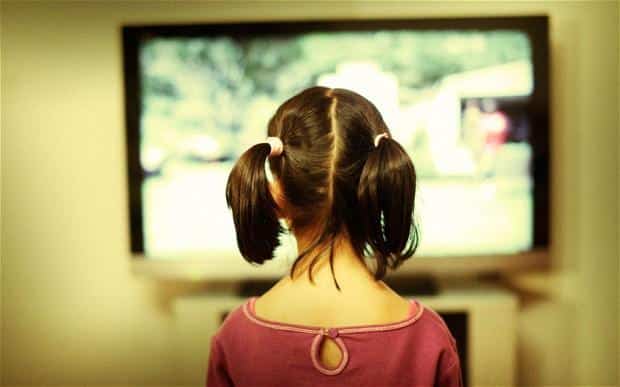
When television sets began to become fixtures in American homes in the 1950s, some people called them idiot boxes.
Since then, we have done our best as a culture to squash that idea by creating everything from history and arts programming, to news documentaries, to programs that teach preschoolers letters and numbers.
A recent study, however, confirms that Grandpa may have been right when he said, “Shut that thing off and go read a book!” Research by the University of Montreal and the CHU Sainte-Justine Children’s Hospital found that every hour beyond two hours in daily TV viewing by young children (2 and over) is associated with poorer vocabulary and math skills as well as diminished social skills by the time they reached kindergarten.
According to Linda Pagani, who led the study, her team’s findings highlight the need for greater parental control of their preschoolers’ TV time.
The American Academy of Pediatrics (AAP) discourages watching television during a baby’s first two years and recommends less than two hours per day beyond the age of two. “It seems that every extra hour beyond that has a negative influence,” Pagani notes.
New DVD Reveals The Secrets To Finding Freedom in a Media Captive Culture
The 2013 study, part of the Quebec Longitudinal Study of Child Development, examined the TV viewing habits of 991 girls and 1,006 boys as reported by their parents. The study only looked at home TV viewing, which is important to note since some of the children were probably exposed to additional TV time at other homes or at daycare facilities. Researchers then compared the children’s TV habits as preschoolers with their skills at kindergarten. The researchers noted that kindergarten abilities are a good predictor of how a child will do in other grades.
As if that study is not reason enough to get kids away from the TV – and from the Internet screen as well – another study shows that second-hand TV watching can affect our kids much like second-hand cigarette smoke can.
On any given day, American children may be exposed to several hours of background TV — that is, TV in their environment that they are not directly watching. A research study, published last year in the medical journal Pediatrics, asked more than 1,450 parents or caregivers with children between 8 months and 8 years old to fill out a diary about their child’s typical day, noting whenever there was a TV on in the background.
The diaries showed that the majority of kids were exposed to almost four hours of background TV a day, and that children under the age of 2 had nearly 5.5 hours of background TV per day.
According to Dr. Michael Rich, an associate professor of pediatrics at Harvard Medical School, background exposure distracts both children and parents. Kids are pulled away from imaginative play when they hear TV in the background, and adults are also less likely to interact with their children when the TV is on, which can affect a child’s language development.
Rich called the study a first step in helping parents become more aware of just how much television has become a part of their child’s environment.
Another effect of excessive TV watching is trouble sleeping.
A study last year by researchers at the Seattle Children’s Research Institute found that that violent or age-inappropriate programming could increase the trouble children have with both falling asleep and staying asleep. The study, which examined the TV and sleep habits of 565 kids aged 3 to 5 years, found that even seemingly harmless cartoons – such as Looney Toons — could disrupt a young child’s sleep or cause nightmares.
“An 8-year-old can watch superheroes and understand that it’s not what happens in real life,” said Michelle Garrison, who wrote the study report. “But the same content can be overwhelming and scary for a 3-year-old. The idea that people might just explode is scary for a 3-year-old.”
After the study timetable, the families changed their children’s TV habits — not necessarily cutting down on TV viewing but changing to different programming – and the frequency of sleep problems dropped. Children who watched age-appropriate shows experienced a 64 percent lower rate of sleep disturbances compared with children in the study control group.
Interestingly, the study kept tracking the families for another 18 months when sleep problems began to reoccur. The study authors attributed this relapse to the parents becoming more relaxed with what their kids were viewing.
It’s important to realize that our kids are bombarded with media in many forms today, including cell phones, tablets and computers in addition to television, so limiting TV time does not take care of the problem.
The AAP’s new 2013 policy statement recommends that parents make a family plan that takes into account the quantity, quality and location of media their kids use, including mealtime and bedtime curfews for electronic devices. It also encourages keeping all of these media out of kids’ bedrooms.
A new survey from the nonprofit advocacy group Common Sense Media reveals that 72 percent of kids ages 8 and under have used a mobile device for some type of media activity, and 17 percent of these young kids use the device on a daily basis.
Victor Strasburger, a professor of pediatrics at the University of New Mexico and co-author of the newly revised AAP policy statement, said that many kids are “spending more time with media than they are in school. They are spending more time with media than in any activity other than sleeping. You could make the argument that media have taken over the primary role of teaching kids from schools and parents in many cases.”
Strasburger added that many parents are clueless about how much time their kids spend on electronic media and that the federal government has not written a comprehensive report on children and the media since 1982, well before the widespread use of the Internet and cellphones.
Here are some of the startling findings of the Common Sense Media survey released this fall:
- The average 8- to 10-year-old surveyed spends nearly eight hours a day with a variety of media; older children and teens spend more than 11 hours a day.
- 71 percent of children and teens surveyed report having a TV in their bedroom; 50 percent have a console video game player in their room.
- 84 percent of all kids and teens surveyed are online; about 75 percent of 12- to 17-year-olds have a cellphone, up from 45 percent in 2004; 88 percent use text messaging.
It’s easy to look at some of these figures and lump all media together as being harmful for our kids. Media has provided our kids with many advantages, however, including better access to all kinds of helpful information. Like everything else we do as parents, we must guide our children to make healthy choices with media. And, yes, in doing so, we may find ourselves saying things like “Shut that thing off and go read book” or “get outside and get some fresh air” — like our grandparents must have done in the early days of television.
That’s okay. They’re only idiot boxes if we ourselves become the idiots.










